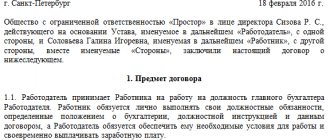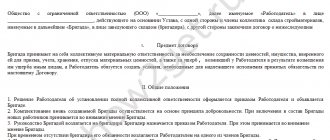The procedure for applying financial liability
Based on the established procedure for holding an employee financially liable, the employer must first conduct an inspection to establish:
- amount of damage;
- the reasons why it was formed.
During this procedure, all necessary measures must be taken to obtain from the perpetrator a written explanation of what happened, and if, due to his opposition, this was not possible, draw up an act (Part 2 of Article 247 of the Labor Code of the Russian Federation).
You can find more complete information on the topic in ConsultantPlus. Full and free access to the system for 2 days.
However, failure to comply with this obligation is not considered a significant violation of the procedure for establishing the cause of damage (appeal ruling of the Investigative Committee of the Tula Regional Court dated March 30, 2017 in case No. 33-976/2017). The courts explain this position by the fact that the employer is still obliged to prove the legality of his actions during the inspection, and the employee has the right to provide an appropriate explanation in court.
The inspection is completed by issuing a final document that reflects the circumstances established during the inspection. In practice, it is called differently: act, protocol, conclusion, memo, etc. It must be signed by all persons who conducted the inspection.
Reducing the amount of bonus as a financial responsibility of the employee
To avoid unnecessary disputes with employees over a lost electronic pass or coffee spilled on a laptop or keyboard, the employer can use other methods of influence, namely financial incentives.
The wage regulations, as a rule, contain the grounds for accruing bonuses (additional payments, allowances) to the employee in the current month. Among such grounds for rewarding an employee, it is advisable in a local regulatory act to provide for careful treatment of the employer’s property, computer equipment, office equipment, and in the conditions for calculating bonuses, allowances, interest - the absence of disciplinary sanctions in the paid month. The procedure for calculating bonuses and the conditions for their payment are the prerogative of the employer. Thus, the employer receives a legal instrument of material influence on the employee, avoiding the restrictions established by the Labor Code of the Russian Federation, as well as encouraging conscientious workers who carefully treat the material assets entrusted to them.
The plaintiff (employee) filed a lawsuit to declare the disciplinary sanction illegal and to recover the unpaid bonus. The employee, by failing to properly fulfill his duties, committed a violation of the law, which led to the imposition of a fine on the employer. The employer reprimanded the employee and reduced the bonus. The plaintiff's arguments that two disciplinary sanctions were imposed on her in the form of a reprimand and a reduction in bonuses were not accepted by the court. Article 199 of the Labor Code of the Russian Federation defines an exhaustive list of disciplinary sanctions; deprivation of bonuses or its reduction are not included in it. According to the Regulations on bonus payments to employees of the employer (defendant), in order to strengthen the material interest in improving the quality of work performed by employees, a monthly bonus for the high-quality performance of their job duties is established in the amount of 50% of the salary in proportion to the time worked; it is determined that the amount of the accrued bonus is reduced by 50% for violation job description. The basis for reducing the premium is an order for the enterprise. Such an order was issued for the enterprise. Having verified the legality of the grounds and compliance with the procedure for imposing a disciplinary sanction, the court rejected the claim.
Please rate your impressions of the article
Circumstances that exclude financial liability
Circumstances that exclude the employee from being held financially liable are listed in Art. 239 Labor Code of the Russian Federation.
The absence of these circumstances must be proven by the employer (clause 4 of the Resolution of the Plenum of the Supreme Court of the Russian Federation dated November 16, 2006 No. 52, hereinafter referred to as Resolution No. 52).
One of them is normal economic risk, which in judicial practice refers to the actions of an employee that correspond to modern knowledge and experience, when the set goal could not be achieved otherwise, and the employee:
- fulfilled his duties;
- was sufficiently caring and prudent;
- took care in advance to prevent losses;
- put at risk not human life/health, but material values (clause 5 of resolution No. 52).
Collective financial responsibility as a method of combating shortages
In the process of conducting the organization's activities, the employer sometimes suffers material damage. In cases where it is impossible to differentiate the responsibility of employees for causing damage, collective financial liability may be established in certain structural units - as a rule, for employees who store, transport, and sell material assets, products and services.
You will learn from this article which employees can be subject to collective financial liability, what documents the employer must fill out, and how damages are recovered.
Order on the application of financial liability
If the culprit is liable only within the average earnings and agrees with the amount of compensation (about the agreement regarding compensation for damage, see the article Agreement on voluntary compensation for material damage by an employee), the employer issues an order to hold the employee financially liable, which is the final stage. The order must be issued within 1 month from the date of final determination of the amount of damage (Part 1 of Article 248 of the Labor Code of the Russian Federation), i.e. from the date of drawing up the final document based on the results of the inspection.
The employee must be familiar with this order against signature (appeal rulings of the Investigative Committee of the Samara Regional Court dated August 1, 2017 in case No. 33-9765/2017, Investigative Committee of the Kemerovo Regional Court dated September 13, 2016 in case No. 33-11585/2016).
You can find out how to draw up such an order and familiarize yourself with its sample in the article Sample order on compensation for material damage by an employee.
Change of financially responsible person
In the course of a company's activities, a change in MOL (as a result of dismissal or transfer to another position) is a regular event that requires re-issuance of documents. The departure of a person burdened with full MO is accompanied by a mandatory inventory of goods and materials or cash, i.e. those assets for which the employee was responsible (clause 27 of PBU dated July 29, 1998 No. 34n) and the subsequent transfer of valuables for reporting to the new employee. Carrying out an inventory due to a change in the MOL is initiated by the manager by issuing an order (form No. INV-22).
Inventory is carried out on a commission basis, its results are drawn up with an inventory list (form No. INV-1, INV-3) in 3 copies (one for the transferring and receiving MC parties and one submitted to the accounting department for subsequent processing). If no discrepancies are identified between the actual availability of valuables and accounting balances, then the manager issues an order to change the financially responsible person. Sample document:
Sample order on the application of financial liability
An order (instruction) to impose financial liability in practice is usually called an order to withhold from the employee’s salary the amount of damage caused to the employer’s property.
It usually states:
- the grounds for its publication (the fact of direct damage and the reasons why this happened);
- final document based on the results of the audit;
- last name, first name and patronymic of the employee, his position;
- amount of withholding in numbers and words;
- retention start date;
- official responsible for executing the order.
When issuing an order, the restrictions on the amount of deductions from wages provided for in Art. 138 Labor Code of the Russian Federation.
A sample order on bringing to financial liability can be downloaded from the link: Sample order on withholding from an employee’s salary the amount of damage caused to the employer’s property.
Varieties of MO
The legislation provides for the following types of liability:
- full - when the employee responsible for the order compensates for the damage in full, regardless of the amount of damage. To ensure that the assignment of this type of responsibility does not contradict the law, these provisions are included in the employment contract concluded with the employee, or are fixed in a separate agreement concluded between the parties. Also, full liability applies if property damage was caused intentionally, while drunk, as a result of direct theft or intentional transfer of intellectual property to the company;
- limited – if the loss is compensated by the person responsible within the limits of the average monthly salary;
- individual – arising when an employee is appointed or accepted to a specific position that involves these obligations. The list of such positions is indicated in Appendix No. 1 to Resolution of the Ministry of Labor of the Russian Federation No. 85, adopted in December 2002;
- collective – if it is not possible to determine the true culprit of the damage due to the simultaneous use of tools, equipment, etc. by several workers.
This is important to know: Liability for the building
Collective (team) financial responsibility
Issues of bringing to collective liability (otherwise known as brigade liability) are regulated by Art. 245 Labor Code of the Russian Federation.
To launch this procedure, it is necessary, first of all, to have a single agreement signed by the entire team (team) on this matter (appeal ruling of the Investigative Committee of the Irkutsk Regional Court dated December 22, 2016 in case No. 33-16726/2016).
Damage cannot be recovered jointly and severally (appeal ruling of the Investigative Committee of the Belgorod Regional Court dated October 29, 2013 in case No. 33-3924). Consequences unfavorable for the employee occur depending on the degree of guilt of each member of the team, determined by agreement of the parties in case of voluntary compensation for damage or by the court in case of judicial recovery (Part 4 of Article 245 of the Labor Code of the Russian Federation).
How to apply for the establishment of a full MO?
The document is drawn up in any form, since there is no single form provided for in Labor Law.
In the center of the document is written the name of the organization and the name of the form, as well as the date of preparation.
The document must list the full names of all employees affected by the order.
The surname of the employee who is appointed head of the team is also written down.
The order must formulate instructions to the HR department on the formation of an appropriate agreement on collective responsibility in full. At the end of the document, the signature of the director, as well as all persons mentioned in it, is placed.
for the store
order establishing full collective financial liability – word.
Limited Liability Company "Prague"
Order
On establishing collective financial responsibility
Due to the presence of valuable property and the need to preserve it in the Prague store, as well as the inability to divide responsibility between team members and sign agreements on the responsibility of each specific employee.
Saratov 05/25/2019
I order:
- Ensure the collective responsibility of store employees who have access to material assets and the movement of goods, as well as to the cash register and documentation for receiving and ordering goods.
- Establish as part of the store employee team:
- Stotskaya A.V. - store director.
- Krasivko T.A - seller.
- Ivanova V.V. - oldest salesman.
- Rytko A.B. - cashier.
- Appoint A.V. Stotskaya as head of the team.
- The HR department will prepare a corresponding agreement.
- I retain control over implementation.
General Director Smirnov V.A. Smirnov
Example for a warehouse
order to establish a full collective MO in the warehouse - word.
Limited Liability Company "Your House"
Order
On establishing collective financial responsibility
Rostov 06.25.2019
Due to the inability to divide responsibility for valuable property and goods belonging to the company between warehouse employees in the event of damage, and draw up a separate document on individual responsibility with each employee.
I order:
- Ensure full collective financial responsibility of all warehouse workers who have access to valuable property and perform the functions of receiving, fixing and selling goods from the warehouse.
- Determine the following responsible persons:
- Gavrilyuk. K.S. - warehouse manager.
- Ivanov R.V. - Warehouse worker.
- Lavitskaya I. Yu. - assistant manager.
- I appoint the head of the warehouse, Konstantin Sergeevich Gavrilyuk, as the head of the team.
- The HR department prepares and signs agreements on the collective responsibility of warehouse employees.
- I retain control over compliance.
I. About the director Melekhov G.P. Melekhov.
Useful video
The collective financial responsibility of employees to the employer is described in this video:
https://youtu.be/JNRHtVxrGko
Inventory must be carried out correctly
As a rule, a shortage of property entrusted to employees under a collective liability agreement is discovered as a result of an inventory. Let us note that property inventory is a mandatory element of the organization’s accounting policy <4>.
<4> Clause 3 of Art. 6 of the Federal Law of November 21, 1996 N 129-FZ “On Accounting” (hereinafter referred to as Law N 129-FZ).
The procedure for conducting an inventory (the number of inventories in the reporting year, the dates of their conduct, the list of property and liabilities checked during each of them, etc.) is determined by the head of the organization, except for cases when an inventory is required <5>. When establishing such a procedure, one should be guided by the Methodological Guidelines for Inventorying Property and Financial Results, approved by Order of the Ministry of Finance of Russia dated June 13, 1995 N 49 (hereinafter referred to as Order N 49).
<5> Clause 26 of the Regulations on accounting and financial reporting in the Russian Federation, approved. By Order of the Ministry of Finance of Russia dated July 29, 1998 N 34n.
In accordance with paragraph 2 of Art. 12 of Law N 129-FZ, inventory is mandatory:
- when transferring property for rent, redemption, sale, as well as during the transformation of a state or municipal unitary enterprise;
- before preparing annual financial statements;
- when changing financially responsible persons;
- when facts of theft, abuse or damage to property are revealed;
- in the event of a natural disaster, fire or other emergency situations caused by extreme conditions;
- during reorganization or liquidation of the organization;
- in other cases provided for by the legislation of the Russian Federation.
Inventories carried out by decision of the organization can be planned or unscheduled. All divisions of the organization or only some may be subject to inspection. For this purpose, the organization usually creates a permanent inventory commission. The grounds for conducting an inventory are the inventory schedule or the order for its implementation and the appointment of a commission. An inventory is also carried out before the employer establishes collective (team) financial responsibility.
All members of the team (team), including the foreman, must be familiar with the order to carry out the inventory before the inventory, participate in its implementation and familiarize themselves with the results of the inventory against signature. For persons who are not familiar with the results of the inventory, an act is drawn up indicating the reasons for non-familiarization.
Note! As judicial practice shows, failure to comply with the requirements for documenting the results and inventory procedures established by Order No. 49 may be the reason for refusal to recover material damage from employees in court (Determination of the Moscow Regional Court dated October 7, 2010 in case No. 33-19052/2010 ).
Compensation Section
It is impossible to do without a section on compensation for damage in the DKMO - both for the employer and for the team members, this issue is of great importance.
If the team treats the entrusted property responsibly, makes every possible effort to ensure its safety, does not allow damage or loss, and the employer provides the necessary conditions for this, there will be no need to apply the provisions of this section (in the absence of force majeure circumstances).
However, such situations do not always arise, so the development of this section in the DKMO must be approached with the utmost care.
IMPORTANT! In accordance with Art. 232 of the Labor Code of the Russian Federation, the party to the employment contract who is guilty of its occurrence is obliged to compensate for material damage caused to the company’s assets.
https://www.youtube.com/watch?v=ytpress
To ensure that those responsible for loss or damage to property compensate for damage legally and in reasonable amounts, the employer will have to work hard. The algorithm of its actions can be presented as follows:
- Make sure that the damage or loss of the company’s assets did not occur due to insufficient organization by the administration of the conditions necessary to ensure safety.
- Comprehensively consider the presence or absence of circumstances that could exclude the financial liability of the team (Article 239 of the Labor Code of the Russian Federation).
- Confirm the existence of direct actual damage and its amount.
- Establish a causal relationship between the actions of the team and the occurrence of damage.
- Prove the illegality of the behavior (actions or inactions) of the team workers.
- Comply with legal requirements when recovering damages from employees.
All actions of the employer must be based on the requirements of labor legislation, take into account judicial practice in matters of liability and compensation for damage, and also be reflected in the Labor Code.
Differences between collective and individual responsibility
- if it is possible to establish the extent of the damage caused by his actions;
- if this way it is possible to prevent unlawful acts;
- if an official action or inaction could lead to material damage;
- if his guilt can be proven.
Individual obligations may be borne by employees of the specialties specified in the list of specialties.
By its nature it can be complete or limited.
Full individual and collective MO implies that the employee (team) reimburses 100% of the cost of property recognized as unusable or lost, while limited – a certain limit that should not exceed the average monthly salary provided for in the staffing table.
In cases where an employee has violated the Criminal Code and is convicted by a court decision, if the damage was caused by him in an inadequate state, with previously planned intent or outside of working hours, liability limited by a limit can be replaced by full liability.
Team financial responsibility implies:
- general access of all team members to the property assets of the enterprise;
- a single agreement on responsibility, signed by all members of the team, department and other units;
- prescribing in the document a definition of the degree of guilt - the procedure for determining and proving it;
- distribution of the amount of damage to all members of the unit, taking into account the amount of personal wages, period of work, and special circumstances;
- prescribing factors that determine the possibility of reducing the amount of payments to individual members.
The employer is obliged to strictly comply with the criteria of individual and collective responsibility.







